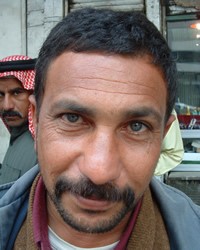Arab, Iraqi in Iraq

Photo Source:
Christiaan Briggs - Wikimedia
Creative Commons
|
Send Joshua Project a map of this people group.
|
| People Name: | Arab, Iraqi |
| Country: | Iraq |
| 10/40 Window: | Yes |
| Population: | 21,070,000 |
| World Population: | 22,449,700 |
| Primary Language: | Arabic, Mesopotamian |
| Primary Religion: | Islam |
| Christian Adherents: | 0.50 % |
| Evangelicals: | 0.20 % |
| Scripture: | New Testament |
| Ministry Resources: | Yes |
| Jesus Film: | Yes |
| Audio Recordings: | Yes |
| People Cluster: | Arab, Levant |
| Affinity Bloc: | Arab World |
| Progress Level: |
|
Introduction / History
Iraqi Arabs descended from a people group cluster called the Levant Arabs. The Levant Arabs originally settled all over the Arabian Peninsula and later migrated to North Africa. They are spread from Israel to Kuwait and as far east as Iran. "Levant" is a broad term that includes several groups of Arabs: the Iraqi, Jordanian, Palestinian, Arabic Jewish, Chaldean and Syrian Arabs.
Arabs from the Arabian Peninsula are considered to be the original Arabs. The Arabian culture was developed by tribes of nomads and villagers who lived in the Arabian Desert for many centuries. It was also from there that Arab migrations began, eventually leading to the expansion of the Arab world. Modern day Iraq is the home of the ancient Sumerian, Assyrian, and Babylonian empires. Iraq was occupied by Britain during World War I. In 1932, Iraq gained its independence. Today three-fourths of Iraq is Arab.
What Are Their Lives Like?
Although Iraqi Arabs have settled in towns or villages, they have held on to their tribal affiliations, and there are hundreds of Arab tribes in Iraq. Their fortress-like villages can be easily defended. Each house has windows on all sides and is built facing the outside of the village. All goods and persons passing through town are strictly controlled. Individual dwellings tend to be elaborately decorated, flat-roofed homes called town houses. Lime wash and brickwork are used around the windows as a form of artistic design. The rooms usually have some type of carpeting, and when entering the house, one must leave his shoes at the door. The walls are lined with mattresses and cushions to sit on and lean against. A main reception room and a kitchen are located on the top floor. The flat roofs are used by the women for drying laundry.
Social life is extremely important to Arabs. They like to share a daily coffee time by sitting on the floor and drinking coffee from cups without handles. Their diet basically consists of wheat bread and porridge made with boiled meat or chicken. Village farmers raise wheat, barley, rice, vegetables, coffee, melons, dates, cattle, sheep and pomegranates. Domestic animals are kept for milk and eggs.
Islam has greatly influenced the lives of Iraqi Arabs. To preserve their people, they are only allowed to marry those inside their own group. Inheritances are passed down through the males. In this system, men inherit more than women. Since children are considered a family's greatest asset, females are valued mostly for their ability to bear children.
In the past, all marriages were arranged by the parents; however, it is becoming more acceptable for young people to choose their own mates.
What Are Their Beliefs?
Iraq is dominated by Shia Muslims (over half) and Sunni Muslims (more than one-third). Islam is a religion of works that is based on five basic "pillars." (1) A Muslim must affirm that "there is no god but Allah, and Mohammed is his prophet." (2) He must pray five times a day while facing Mecca. (3) He must give generously. (4) He must fast during Ramadan, the ninth month of the Muslim year. (5) He must try to make at least one pilgrimage to Mecca in his lifetime.
The Apostle Thomas brought Christianity to Mesopotamia. The Church was centered in and spread from the Assyrian city of Arbel, located in what is now northern Iraq. Today there are several denominations that have churches in Iraq.
What Are Their Needs?
The gospel is impeded by local culture that is strongly Islamic. The American invasions have reinforced anti-Christian beliefs. Iraqi Arabs need the spiritual hunger it takes to seek and find Jesus despite all the obstacles.
Prayer Points
Pray that Iraqi Arab Christians would be protected from harm and persecution.
Pray for Iraqi Arabs to have enough spiritual hunger to seek and find Jesus Christ no matter what the cost.
Ask God to change the spiritual climate over Iraq.
Pray for the Holy Spirit to give dreams of the risen and victorious Christ to Iraqi Arab elders and family leaders.